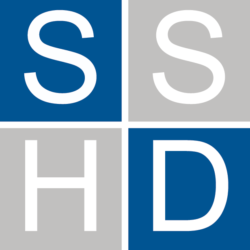This month we are getting better acquainted with the research of Kristine J. Ajrouch, the current SSHD president and a professor of sociology at Eastern Michigan University.
Taking closer look at research and experiences of SSHD members
~Researcher’s Window~
- What drew you to do work in human development?
My doctoral research focused on social relationships between U.S. born adolescents and their immigrant parents in the pursuit of understanding ethnic identity formation. One subtle theme articulated by the adolescents included insistence that their ethnicity was evident through a firm commitment to ensuring their parents would never have to “be put” in a nursing home. These narratives steered me to begin asking questions about the aging experience, and led me to a postdoctoral fellowship at the University of Michigan. My post-doctoral training centered on the study aging, but involved working with individuals from different disciplines. Through this training I was introduced to the life span and life course perspectives. I became firmly committed to using these frameworks to examine and better understand social life. I came to realize that aging is a life-long process, and a pillar of the human condition. Human development, as an interdisciplinary field, emphasizes the importance of all life stages/ages and moves beyond the individual to highlight links between multiple levels of human life including the biological, social and cultural. This premise appealed to my commitment to the scientific study of social life.
- Did you have any mentor or a researcher who had substantial influence in your path or work? Is there a significant moment or story that capsulizes the nature of that influence on your scholarship or professional journey?
The mentor and researcher who had substantial influence on my path is the developmental psychologist Toni Antonucci. Her name appeared on a list of faculty who would be willing to mentor during my postdoctoral training in aging. Above and beyond social relations, she listed cross-cultural issues as her interest and expertise. I made an appointment to meet with her, to ask if she would be willing to work with me during my fellowship. Knowing that I was trained as a sociologist, and wise to the importance of disciplinary mentoring for future career trajectories, she advised me to meet with a well-known and influential sociology colleague also listed as a willing mentor with expertise in race and ethnicity. She then told me that if after meeting with him I remained interested to work with her, to come back and see her. There was something appealing about the way Toni conveyed her advice that reinforced my initial interest to work with her. And so, after meeting with the suggested faculty member, I promptly went back and told her I appreciated the advice to meet the other faculty member, but believe my interests align more closely with hers. Since that day she has been an important influence on my professional journey and scholarly endeavors. She introduced me to the field of human development, and I have been committed ever since.
- You have a range of important work, select 1-2 findings that you feel are key contributions to human development.
My research interests have focused on three areas: 1) social relations; 2) Arab Americans; and 3) the Middle East. I have used multiple methodologies to study these topics, including the collection and analysis of survey data, focus group discussions, and in-depth one-on-one interviews. Facility with multiple methods has enabled me to identify key trends at the population level, but also to discover unique meanings at the cultural level. Recognizing that social relations are multidimensional, my program of research investigates the complex ways that stratifying factors influence their form and function. A key contribution to the study of human development may be found in recent work I carried out with colleagues that investigated variations in social networks among adults aged fifty and older in diverse regions of the world: Japan, Lebanon, Mexico, and the United States. This analysis attends to the significance of national context for advancing understanding of links between social networks and age. Identical measures of social networks and closeness were collected in each nation. Findings illustrated, on the one hand, a universal pattern concerning the presence of children in the networks of older adults; that is, older age was associated with a higher proportion of children, and children were also most likely to be nominated as one of the closest relationships in all four nations. This finding may reflect that a universal characteristic of human bonding involves keeping children close, even in late-life. Yet, other dimensions of social networks showed differences by age that were sensitive to national context. In particular, only in the U.S. was older age associated with smaller networks. Age was not associated with network size in Japan or Mexico, suggesting continuity between mid- and later- life with regard to the number of people identified as close and important. In Lebanon, contrary to the pattern in the U.S., increasing age is associated with larger social networks. Hence, links between age and network size are unique; they vary within national context. Identifying universal and unique characteristics of social networks in later life provides a preliminary empirical basis upon which to advance developmental science as a useful framework to inform policies that can facilitate health and well-being among middle-aged and older people around the world.
- If you had just one wish for the study of human development, what would it be?
My wish is to incorporate culture as a more central aspect of studies in human development. Culture signifies a fundamental aspect of human life. It facilitates human interaction by providing meaning to lived experience. Accounting for culture in both theories and methods potentially advances the field by connecting the macro (contextual) and micro (personal) levels of human experience. Yet, culture should be understood as dynamic and complex. It fundamentally shapes individuals and simultaneously is shaped by individuals. Attention should be placed on making distinctions between ideal aspects of culture and pragmatic realities as well as developing ways to make culture more visible in both research and in public discussions. Attention to culture holds great potential for advancing understanding of life trajectories in human development.
- A mentoring statement or quote you find most meaningful or life-changing
Education and hard work are necessary to succeed, but alone are usually insufficient. Getting to know others in the field, building social networks and cultivating social capital through those connections will lead to opportunity and resources.
About the researcher
 Kristine J. Ajrouch, PhD is Professor of Sociology at Eastern Michigan University. She is also Adjunct Research Professor at the Institute for Social Research at the University of Michigan. Her research has focused, for over twenty years, on Arab Americans in the U.S. beginning with ethnic identity formation among adolescent children of immigrants followed by a focus on aging from the perspective of older adults in the metro-Detroit Arab-American and Muslim communities. A core area of study concerns links between social networks and health with focused attention to how stratification and immigration influence network form and function. She recently initiated a program of study concerning the topic of family ties, aging and health in Beirut, Lebanon following a Fulbright award in 2008. Professor Ajrouch also studies the topics of forgiveness and immigrant integration in comparative perspective. She currently serves as President of the Society for the Study of Human Development, and works on projects that enhance global awareness and promote cross-cultural understanding.
Kristine J. Ajrouch, PhD is Professor of Sociology at Eastern Michigan University. She is also Adjunct Research Professor at the Institute for Social Research at the University of Michigan. Her research has focused, for over twenty years, on Arab Americans in the U.S. beginning with ethnic identity formation among adolescent children of immigrants followed by a focus on aging from the perspective of older adults in the metro-Detroit Arab-American and Muslim communities. A core area of study concerns links between social networks and health with focused attention to how stratification and immigration influence network form and function. She recently initiated a program of study concerning the topic of family ties, aging and health in Beirut, Lebanon following a Fulbright award in 2008. Professor Ajrouch also studies the topics of forgiveness and immigrant integration in comparative perspective. She currently serves as President of the Society for the Study of Human Development, and works on projects that enhance global awareness and promote cross-cultural understanding.
Edited and launched by Deborah J. Johnson & Yoko Yamamoto
SSHD Publicity Committee

